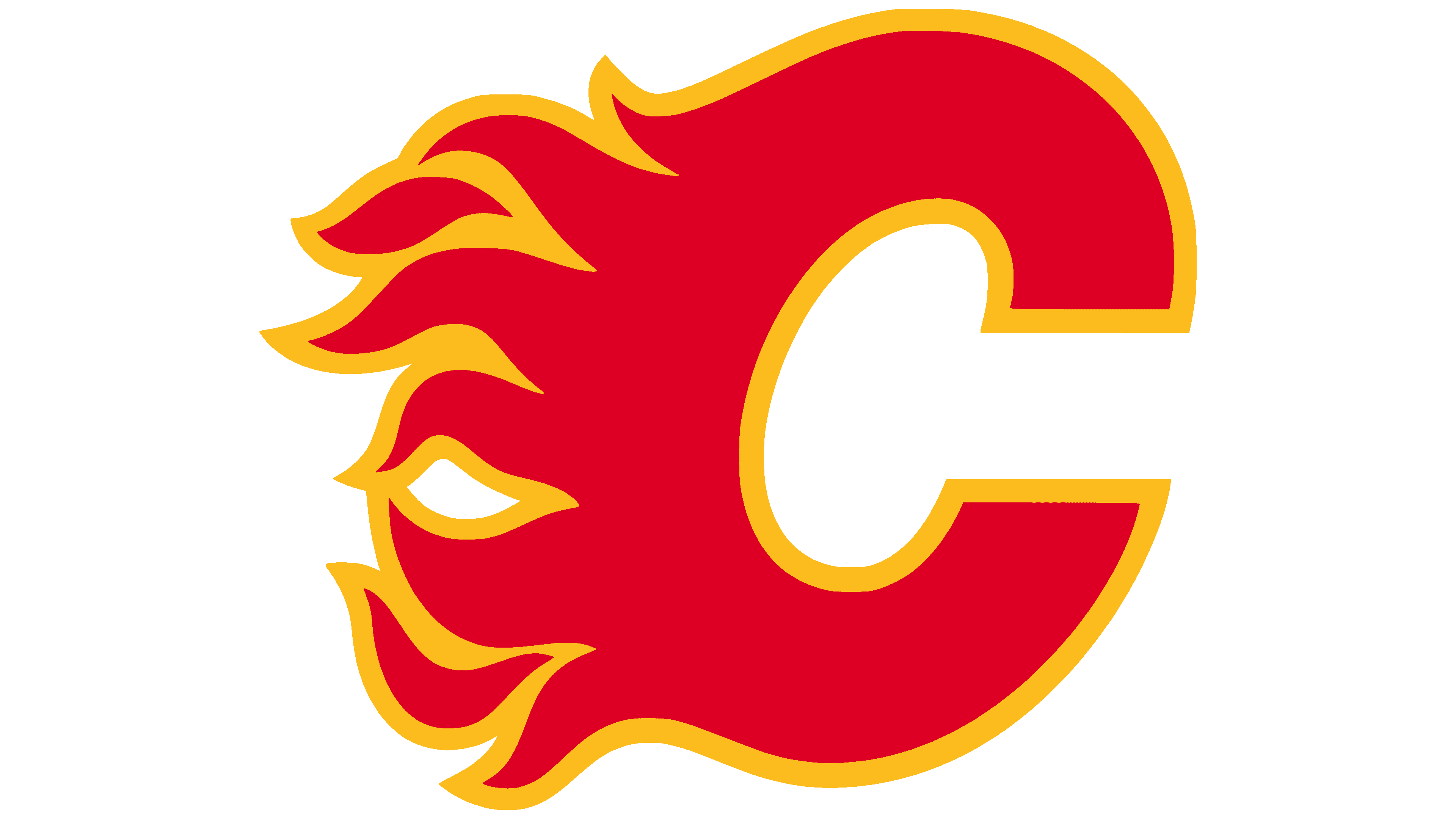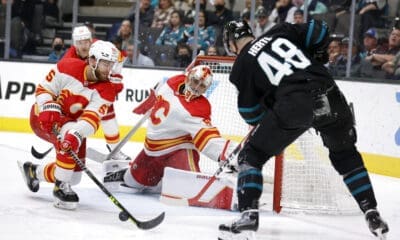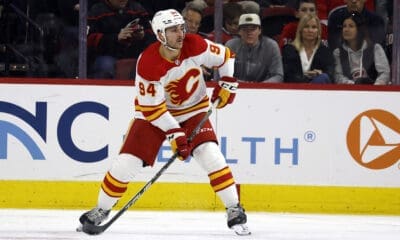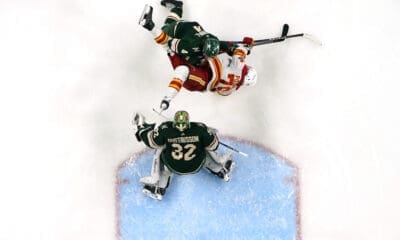Calgary Flames
Flames All-Time Countdown Chapter CI: 78-76
Eddy Beers, Eddy Beers, Eddy Beers. Also: Paul Ranheim and James Patrick, who were traded for one another.

78. Paul Ranheim
Ranheim was a 6’1″, 210 lb. left winger born on January 25th, 1966. A St. Louis, Missouri native, he was drafted by the Flames in the second round, 38th overall, of the 1984 NHL Entry Draft. He then played four seasons of collegiate hockey, from 1984-88, with the University of Wisconsin. He scored 176 points in 159 games before joining the IHL’s Salt Lake Golden Eagles in 1988-89, scoring 68 goals and 97 points in 75 games. He joined the Flames for five games in that year, but did not play any playoff games as the Flames won the Stanley Cup.
The 1989-90 season was Ranheim’s rookie NHL season, as well as his best. He played 80 games and scored a career high 26 goals on a career high 197 shots, putting up a career high 54 points in total. He also registered 23 penalty minutes and a plus-27 rating, and finished eighth in Calder Trophy voting. The Flames finished that season with a 42-23-15 record, but lost in six games to the Kings in the first round of the playoffs. Ranheim played all six games, scoring a goal and three assists.
In 1990-91, Ranheim only played 39 games. He scored 14 goals on 108 shots, and 16 assists gave him 30 points on the year. Ranheim only recorded four penalty minutes, and managed a plus-20 rating during the games played. The Flames played to a 46-26-8 record but fell in seven games to the Edmonton Oilers in the first round of the playoffs. Ranheim played all seven games, scoring two goals and two assists.
Ranheim returned in the 1991-92 season, once again playing 80 games. Even though he didn't score as many goals as he did in his rookie year, he actually had a better shooting percentage: 14.5% compared to 13.2%. Ranheim got 23 goals on 159 shots. Twenty assists gave him 43 points on the season, in which he also collected 32 penalty minutes, and finisheda plus-16. The Flames finished with a 31-37-12 record, and did not make the playoffs.
The 1992-93 season saw Ranheim repeat his 43-point effort from the previous year. He scored 21 goals on 179 shots over 83 games, and also put up 26 penalty minutes. He finished with a minus record for the first time since becoming an NHL regular, a minus-4. That season, the Flames had a 43-30-11 record, and once again lost in the first round of the playoffs to the Los Angeles Kings. Ranheim played in all six games, but only scored one assist.
The 1993-94 season was Ranheim’s final season with the Flames. He played 67 games for Calgary, scoring 10 goals and 24 points, amassing 20 penalty minutes and a minus-7 rating before he was traded. Ranheim, along with Gary Suter and Ted Drury, went to the Hartford Whalers for Michael Nylander, James Patrick, and Zarley Zalapski.
Ranheim played another nine seasons in the NHL for Hartford/Carolina and Philadelphia, before getting traded to the Phoenix Coyotes in the 2002-03 season to finish his career. Ranheim’s best seasons were with the Flames: since leaving Calgary, he scored 166 points in 659 games, and while he was a plus-49 with the Flames, otherwise, he was a career minus-51.
All-Time Statline: 354 games, 94 goals, 100 assists, plus-49 rating, 105 penalty minutes, 13.20 point shares.
77. Eddy Beers
Beers, born on October 12th, 1959, was a 6'2", 194 lb. left winger from Merritt, British Columbia. He played three seasons with the BCJHL's Merritt Centennials before joining the University of Denver. From 1979-82 Beers played for Denver, capping off his third season with 50 goals and 84 points in 42 games.
Beers joined the Flames after his junior year, getting five games in with the Flames at the end of the 1981-82 season. He scored a goal and an assist in those games, as well as putting up 21 penalty minutes and finishing even. The Flames played three playoff games that season, but Beers didn't play in any of the games.
In 1982-83, Beers split his time between the CHL’s Colorado Flames (29 points in 29 games) and the Calgary Flames. He played 41 games in the NHL that season, scoring 11 goals on 72 shots, and adding 15 assists to finish with 26 points in the NHL. Beers registered another 21 penalty minutes, and finished a plus-11. The Flames had a 32-34-14 record that season. They defeated the Vancouver Canucks 3-1 in the first round of the playoffs, but fell 4-1 to the Oilers in the next round. Beers played eight of the 10 playoff games, scoring a goal, an assist, and registering 27 penalty minutes.
The 1983-84 season was Beers' first full season in the NHL. He played 73 games in what was his career-best season: 36 goals, 189 shots, a shooting percentage of 19.0%, and 75 points were all career highs for him. He also collected 88 penalty minutes and finished with a plus-7 rating as the Flames themselves had a 34-32-14 record. Once again, the Flames defeated the Canucks 3-1 in the first round of the playoffs, but fell to the Oilers 4-3 in the second round. Beers played all 11 games, scoring two goals, five assists, and registering 12 penalty minutes.
Beers played a career-high 74 games in the 1984-85 season. He scored 28 goals on 171 shots and set a career high in assists with 40, finishing the season with 68 points. He collected a career high 94 penalty minutes that season, and once again finished a plus-7. He helped the Flames to a 41-27-12 record. The Flames fell 3-1 in the first round of the playoffs to the Winnipeg Jets. Beers played in three of the playoff games, scoring a goal.
The 1985-86 season was Beers’ last. He played 33 games with the Flames, scoring 11 goals and 21 points. He put up eight penalty minutes and had a minus-3 rating before he was traded to the St. Louis Blues alongside Charlie Bourgeois and Gino Cavallini for Joey Mullen, Terry Johnson, and Rik Wilson. With St. Louis, Beers played 24 games, scoring seven goals, 18 points, and 24 penalty minutes. He finished his hockey career by playing 19 playoff games for the Blues, scoring three goals and seven points.
Beers stayed in hockey after his retirement, going back to the BCJHL, later BCHL, to coach, rejoining the Merritt Centennials in his final three seasons.
All-Time Statline: 226 games, 87 goals, 105 assists, plus-22 rating, 232 penalty minutes, 13.23 point shares.
76. James Patrick
Patrick, a 6’2″, 200 lb. defenseman from Winnipeg, Manitoba, was born on June 14th, 1963. The New York Rangers drafted him ninth overall int he 1981 NHL Entry Draft. Following the draft, Patrick played two seasons for the University of North Dakota before joining the Canadian International Team for the 1983-84 season. After 70 games he made his NHL debut for the Rangers. He played 11 seasons for the Rangers, scoring 467 points in 671 games, before being traded to the Hartford Whalers in the 1993-94 season. After just 47 games with Hartford, still in that same season, the Flames acquired him, as well as Michael Nylander and Zarley Zalapski, for Gary Suter, Paul Ranheim, and Ted Drury.
Patrick played 15 games for the Flames to finish the 1993-94 season, scoring two goals, two assists, recording six penalty minutes and a plus-6 rating. He played all seven playoff games the Flames played that season, but only scored one assist before the Flames were eliminated by the Vancouver Canucks.
The 1994-95 season was Patrick’s first significant time as a Flame. He failed to score any goals during the half-season, although he did record a shot per game. Over 43 games Patrick scored 10 assists, recorded 14 penalty minutes, and finished a minus-3. The Flames that year had a 24-17-7 record, and fell in seven games to the San Jose Sharks in the playoffs. Patrick only played five of those games, recording just one assist.
Patrick got back on the scoreboard in his first full regular season with the Flames. In 1995-96, he scored three goals on 116 shots over 80 games. Thirty-two assists saw it be a more productive year. In addition to his 35 points, Patrick recorded 30 penalty minutes and finished a plus-3. A 34-37-11 record saw the Flames in the playoffs, but quickly swept by the Chicago Blackhawks; Patrick played all four games, but only recorded two penalty minutes.
Patrick only played 19 games in the 1996-97 season. He once again scored three goals, albeit this time on just 22 shots; he also scored just one assist. Six penalty minutes and a plus-2 were all Patrick had to show for that year, and the Flames failed to make the playoffs.
The 1997-98 was Patrick's final season as a Flame. He returned to action, playing 60 games over the course of the season. Patrick scored six goals on 57 shots, and had 17 points total, as well as 26 penalty minutes. He finished with a minus-2 rating and the Flames finished with a 26-41-15 record, failing to make the playoffs.
A free agent, Patrick signed with the Buffalo Sabres, where he spent the rest of his NHL career. He played six seasons for Buffalo, scoring 74 points over 345 games. His final NHL game was in 2003-04; he sat out the lockout year, played a season for the Frankfurt Lions in the German league in 2005-06, and then retired. The following season, Patrick joined the Buffalo Sabres as an assistant coach, a position he stayed in until 2013. Last season he was hired as an assistant coach for the Dallas Stars under Lindy Ruff, where he still is today.
All-Time Statline: 217 games, 14 goals, 56 assists, plus-6 rating, 82 penalty minutes, 13.23 point shares.
by Kevin Kraczkowski








